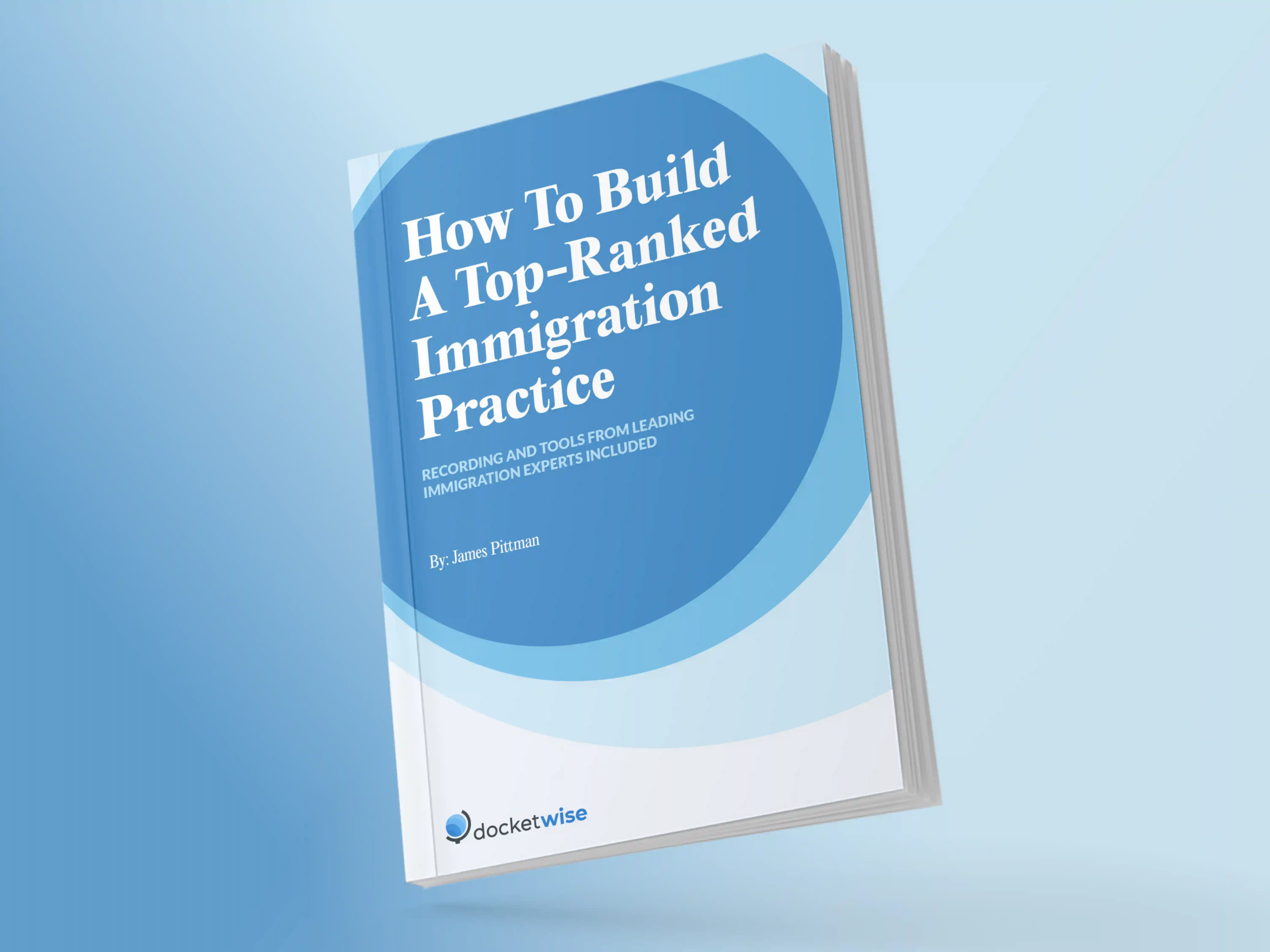One of the most crucial aspects of managing a successful immigration law firm and planning for its growth is monitoring and evaluating the firm’s profitability over time. But as with many other non-legal aspects of running a law firm, this isn’t something taught in law school and is often learned by doing. Hopefully this article can help.
In this article, we will explain what profitability is in general, dive into what profitability looks like in the context of running a law firm, and share some tips about how you as an immigration lawyer can increase the profitability of your immigration law firm.
Let’s dive in.
What is profitability
According to Investopedia, “profit” is realized “when revenue generated from a business activity exceeds the expenses, costs, and taxes." Profitability has to do with both your law firm’s income and expenses. To calculate your income, look at the money your law firm generates through the services you provide, including what you charge for casework, consultation or other administrative fees, speaking engagements or consulting other lawyers, and any other instance where your firm charges money and gets paid. Your expenses, on the other hand, are the money you have to spend to do your work, including office materials, technology licenses, office space, staff or contractor salaries, professional association fees, annual taxes, and more.
Overall, the goal is to maximize revenue while reducing costs and maintaining, if not increasing, quality.
Thinking about profitability involves periodically evaluating your rates to ensure you charge enough for your services, and deciding, if you want to grow, whether growing your firm will actually also translate to growing profit. Indeed, in the law firm context, there are different angles to consider when analyzing profitability for your firm, so let’s take a look.
What does profitability mean for an immigration law law firm
Profitability should go beyond mere income being greater than expenses. Particularly in the immigration law industry where flat fees are the norm, achieving profitability means looking at revenue versus costs and the actual time spent actively working on your casework.
Why? Because if you spend so much time on your casework that your effective hourly rate falls below what you want to be earning, the fact that you’re technically earning more than you spend isn’t a very strong indicator of how strong your law firm is as a business. In this sense, profitability should be looked at as a proxy for the strength of your business in addition to just a mathematical formula.
To maintain this strength through Q4, we recommend coordinating closely with your financial partners; resources like this Year-End Accounting Playbook can help ensure your external team is prepared for the fiscal close
Thus, you need to understand how every minute of work is spent, by you and your staff if you have any, and to what extent that work generates revenue for the firm. The best way to do this is to have staff track their time whenever working on casework to then be able to calculate the effective hourly rate. Admittedly, in the immigration space, this isn’t often done because cases are billed on a flat fee basis and thus tracking time feels like an unnecessary burden. But in reality, while time tracking won’t impact revenue directly (though you may have a policy that a case that takes an unreasonable amount of time due to unforeseen circumstances, etc., may have additional fees added to it), it may help you better strategize whether or not to increase fees, which staff to put on what matters (or train, or let go), and potentially even what case types to no longer offer depending on how profitable they are.
In summary, understanding what profitability means and how it can be looked at in the context of your immigration law firm can help you make better decisions, optimize your time and your staff’s time, and perhaps even automate when it makes sense.
How do you increase profitability?
To increase profitability in your immigration law firm, here are some tips to keep in mind:
Set clear objectives and be consistent
Like in other areas of life, setting goals for your law firm with clear steps will help you remain focused and hold yourself and your team accountable. A helpful way to frame those goals is following the SMART acronym: goals should be Specific, Measurable, Achievable, Relevant, and Timely. You can set these by yourself if you run a solo firm or with your team at the beginning of the year. If you struggle with goal-setting and holding yourself accountable, you may want to consider working with a coach, if possible, not only to help you gain clarity on your goals but to support you when things get challenging. A lawyer-specific coach who is familiar with the ins and outs of running a law firm may also help you evaluate how feasible your goals are as things change.
Save time by automating and outsourcing tasks
There are tech tools and platforms, including those specifically made for immigration lawyers to help automate payment, organize cases, schedule and keep track of client files, transcribe meetings, and much more. If you’re a solo or small law firm owner and you’re open to getting outside help, you can also look at certain tasks to outsource to ensure you’re truly dedicating your time to the things that will keep your firm profitable: e.g. billable hours. Some examples of work you can outsource include paralegal work, receptionist services, immigration brief writing, and even court appearances by other lawyers.
Looking closely at Key Performance Indicators (KPIs)
Key Performance Indicators (KPIs) are the benchmarks that show progress toward a goal. Some Key Performance Indicators include collections rates (how many hours have you been paid for the hours billed), utilization rates (hours worked in comparison to hours billed), or conversion rates (responses to marketing campaigns or ads that result in signing up a paying client). And for immigration lawyers who charge flat fees, especially if you offer payment plans, your collection rate is an important KPI to look at as well. Utilization rates should be as close to 100% as possible, which is where, again, automation and outsourcing will help you ensure you can dedicate your time to billable hours as much as possible. Finally, if your clients are happy, the more likely you can maximize their Lifetime Value (CLV). Satisfied customers will return to you for their continued immigration status, refer you to their friends that need a lawyer, and keep you front of mind as their preferred immigration lawyer.
Save costs where you can without sacrificing quality
If office space doesn’t make financial sense for your firm or if you’re running your firm on your own, consider running your firm remotely. This would not only allow you to save on overhead costs, which translates to not having to pass those costs onto your clients, it may also afford you the flexibility to work from anywhere and adjust your work to your personal needs and personal priorities so you can deliver your best work, minimize error, and those optimize the hours you spend on client work.
Track your profitability and manage your immigration law firm with Docketwise
From time tracking to invoicing and our comprehensive customer relationship management (CRM) tools, Docketwise is the ideal, one-in-all platform to track your cases for data driven decisions that keep you focused on achieving your goals, delivering outstanding legal services and staying profitable.
With our full library of immigration forms, easy-to-use client questionnaires, and industry-leading API integrations, Docketwise helps you stay up to date on all your immigration cases, communicate easily with your clients, and otherwise build and manage your immigration law firm.
If you want to learn more about Docketwise, schedule a demo or sign up for our Immigration Briefings newsletter for daily and weekly immigration updates!
Unlock Your Success as an Immigration Lawyer.
Download Now
About the author

James PittmanAttorney & Co-Founder8am Docketwise
James E. Pittman is a distinguished immigration attorney, co-founder of 8am DocketWise, and Director and Subject Matter Expert (SME) in immigration at 8am, a leading platform delivering purpose-built solutions for legal and accounting professionals. A former patent attorney, he later built a highly regarded U.S. immigration practice and is a sought-after CLE educator on immigration law and ethics. James is admitted in NY, NJ, before the USPTO, and hosts the DocketWise video podcast Immigration Uncovered.
